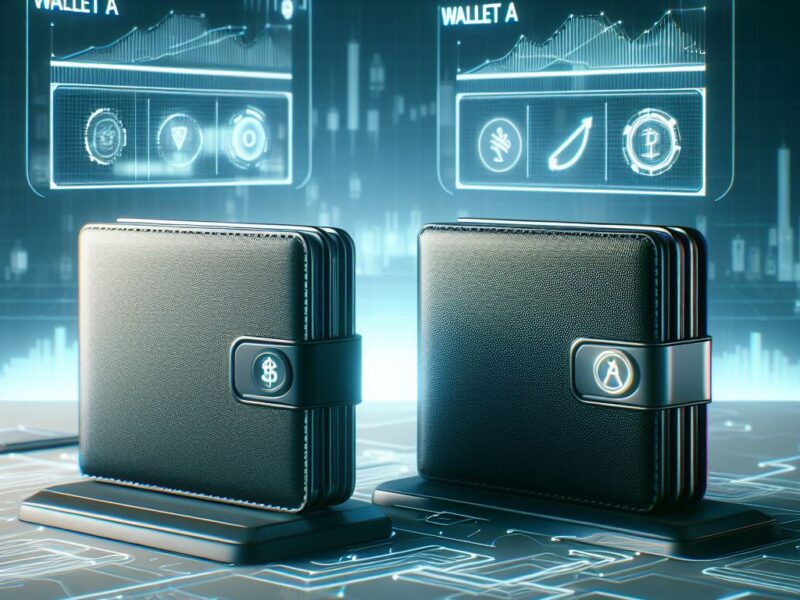When it comes to storing and managing your cryptocurrencies, choosing the right wallet is a decision that can have a significant impact on the security and accessibility of your digital assets. One type of wallet that is commonly used, particularly among beginners, is the custodial wallet.
What is a Custodial Wallet?
A custodial wallet is a type of cryptocurrency wallet where a third party, such as an exchange or online wallet provider, holds and manages your private keys on your behalf. This means that while you own the funds in the wallet, you don’t have complete control over them, as the third party has access to your private keys and can potentially move or restrict your assets.
Advantages of Custodial Wallets
1. Ease of Use
One of the main advantages of custodial wallets is that it’s easy to use. Setting up a custodial wallet is often as simple as creating an account with the wallet provider and funding it with your desired cryptocurrency. You don’t need to worry about generating or storing private keys, as the provider handles this for you.
This ease of use makes custodial wallets an attractive option for those new to the world of cryptocurrency, as they can start buying, selling, and trading digital assets without having to face the complexities of private key management.
2. Accessibility
Custodial wallets are typically accessible from any device with an internet connection, making it easy to manage your funds on the go. Many custodial wallet providers offer web-based interfaces and mobile apps, allowing you to check your balance, send and receive funds, and even trade cryptocurrencies directly from your wallet.
This accessibility can be particularly useful for those who frequently use their cryptocurrencies for online purchases or trading, as they can quickly and easily access their funds whenever they need them.
3. Recovery Options
If you lose access to your non-custodial wallet’s private keys, your funds are lost forever. However, with a custodial wallet, the provider typically offers recovery options in case you lose access to your account.
Crypto Arbitrage Trading What It Is And How It Works
For example, many custodial wallet providers allow you to reset your password or regain access to your account through email or SMS verification. While this does introduce some security risks (which we’ll discuss later), it can provide peace of mind for those worried about losing access to their funds due to forgotten passwords or lost devices.
4. Built-In Exchange Features
Many custodial wallets, particularly those offered by cryptocurrency exchanges, come with built-in trading features that allow you to buy, sell, and swap cryptocurrencies directly from your wallet. This can be convenient for those looking to actively trade or invest in different cryptocurrencies, as they can manage their entire portfolio from a single platform.
Some custodial wallets even offer additional features like staking, lending, or earning interest on your holdings, providing opportunities to grow your cryptocurrency portfolio without having to move your funds to external platforms.
Disadvantages of Custodial Wallets
1. Lack of Control
The main disadvantage of custodial wallets is that you don’t have complete control over your funds. Since the third-party provider holds your private keys, they have the ability to freeze, seize, or restrict access to your assets at any time. This lack of control can be a significant concern for those who value the decentralized and autonomous nature of cryptocurrencies.
In extreme cases, the wallet provider may even be compelled by law enforcement or government agencies to hand over your funds or block your account, leaving you with little recourse. This is a stark contrast to non-custodial wallets, where you maintain full control over your private keys and, by extension, your cryptocurrencies.
2. Security Risks
Custodial wallets are more susceptible to security breaches and hacks compared to non-custodial wallets. Because the wallet provider holds the private keys to many users’ funds, they become an attractive target for hackers and cybercriminals.
If the wallet provider’s servers are compromised, your funds could be stolen or lost forever. This risk is compounded by the fact that many users tend to store large amounts of cryptocurrency in custodial wallets for convenience, making the potential losses even more significant.
Furthermore, if the wallet provider itself is dishonest or engages in fraudulent activities, your funds could be at risk. There have been numerous instances of custodial wallet providers suddenly shutting down, disappearing with users’ funds, or being revealed as scams.
3. Privacy Concerns
When using a custodial wallet, you typically need to provide personal information and undergo identity verification processes, such as Know Your Customer (KYC) and Anti-Money Laundering (AML) checks. This can be a privacy concern for those who value the anonymity and pseudonymity offered by cryptocurrencies.
By providing your personal information to the wallet provider, you’re trusting them to keep your data secure and not share it with third parties without your consent. However, there’s always the risk of data breaches or the provider selling your information to advertisers or other entities.
Moreover, the wallet provider has access to your transaction history and other sensitive data, which they may be required to share with authorities or use for their own purposes, such as analyzing user behavior or targeting ads.
4. Dependence on Third Parties
By relying on a custodial wallet, you’re dependent on the wallet provider to maintain the security and accessibility of your funds. If the provider experiences technical issues, goes offline, or decides to discontinue their services, you may face difficulties accessing your assets or transferring them to another wallet.
This dependence on third parties goes against the decentralized ethics of cryptocurrencies, which aim to provide users with financial autonomy and independence from intermediaries. If the wallet provider becomes unresponsive or uncooperative, you may have limited options for recourse or resolving issues.
Tips for Using Custodial Wallets Safely
If you decide to use a custodial wallet despite the risks, consider the following tips to enhance the security of your funds:
- Choose a reputable wallet provider with a strong track record of security and reliability. Look for providers that have been audited by third parties and have a history of promptly addressing security issues.
- Enable two-factor authentication (2FA) to add an extra layer of protection to your account. This typically involves requiring a second form of verification, such as a code sent to your phone, in addition to your password.
- Use strong, unique passwords for your custodial wallet accounts and avoid sharing them with anyone. Consider using a password manager to generate and store complex passwords securely.
- Regularly monitor your account activity and enable notifications for unusual transactions. This can help you quickly detect and respond to potential security breaches or unauthorized access to your funds.
- Consider transferring large amounts of cryptocurrency to a non-custodial wallet for long-term storage. While custodial wallets may be convenient for smaller amounts or frequent trading, holding substantial sums in a wallet where you control the private keys can provide added security and peace of mind.
Ultimately, the decision to use a custodial wallet depends on what you really want, your priorities, and risk tolerance. If you prioritize convenience and ease of use, a custodial wallet may be a suitable choice, especially for smaller amounts or frequent trading. However, if you value complete control over your funds and prioritize security and privacy, a non-custodial wallet may be a better option.
Frequently Asked Questions
1. Are custodial wallets safe?
Custodial wallets are generally considered less secure than non-custodial wallets because a third party controls your private keys. However, reputable custodial wallet providers employ various security measures, such as cold storage, multi-signature authentication, and regular security audits, to protect users’ funds. The safety of a custodial wallet largely depends on the provider’s security practices and track record.
2. Can the wallet provider access my funds?
Yes, since the wallet provider holds your private keys, they have the technical ability to access and control your funds. This is why it’s crucial to choose a trustworthy and reputable provider that has a strong history of security and reliability. Reputable providers should have strict internal policies and controls to prevent unauthorized access to users’ funds.
3. What happens if the wallet provider goes out of business?
If a custodial wallet provider goes out of business, there is a risk that you may lose access to your funds. To mitigate this risk, choose a provider that has a clear policy for handling such situations, such as a plan to allow users to withdraw their funds before shutting down. Additionally, it’s a good idea to regularly withdraw your funds to a non-custodial wallet for long-term storage.
4. Can I use a custodial wallet for all my cryptocurrencies?
Most custodial wallets support a range of cryptocurrencies, but the specific coins and tokens supported vary by provider. Before choosing a custodial wallet, make sure it supports the cryptocurrencies you want to store and trade. Some providers may also offer separate wallets for different cryptocurrencies, so you may need to use multiple wallets to manage all your assets.
5. How do I withdraw funds from a custodial wallet?
The process for withdrawing funds from a custodial wallet varies by provider but typically involves the following steps:
- Log in to your wallet account.
- Navigate to the withdrawal or send section.
- Enter the recipient’s wallet address and the amount you want to withdraw.
- Confirm the transaction and pay any associated fees.
- Wait for the transaction to be processed and confirmed on the blockchain.
Some providers may have additional security measures, such as withdrawal limits or manual approval processes, to prevent unauthorized withdrawals.
6. Are there any fees associated with using a custodial wallet?
Custodial wallet providers may charge various fees, such as:
– Deposit fees for adding funds to your wallet
– Withdrawal fees for sending funds out of your wallet
– Trading fees for buying, selling, or swapping cryptocurrencies within the wallet
– Account maintenance fees for holding funds in the wallet
The specific fees and fee structure vary by provider, so it’s essential to review the provider’s fee schedule before choosing a custodial wallet.
7. Can I use a custodial wallet for staking or earning interest on my cryptocurrencies?
Some custodial wallet providers offer staking or interest-earning features, allowing you to earn rewards for holding specific cryptocurrencies in your wallet. These features can be convenient for users who want to passively grow their holdings without managing the staking process themselves. However, it’s important to understand the terms, risks, and rewards associated with these features before participating.
When considering a custodial wallet for staking or earning interest, look for providers that offer competitive reward rates, clear terms and conditions, and a strong track record of paying out rewards to users. Additionally, be aware that staking or earning interest may involve locking up your funds for a specific period, during which you may not be able to withdraw or trade your cryptocurrencies.
8. How do I choose a reputable custodial wallet provider?
When selecting a custodial wallet provider, consider the following factors:
– Security measures: Look for providers that employ industry-standard security practices, such as cold storage, multi-signature authentication, and regular security audits.
– Regulatory compliance: Choose providers that comply with relevant regulations, such as KYC/AML requirements, and have a good standing with regulatory bodies.
– Insurance: Some providers offer insurance coverage for users’ funds, which can provide added protection in case of security breaches or other issues.
– Reputation and track record: Research the provider’s reputation in the cryptocurrency community, look for user reviews, and consider their track record of security and reliability.
– Customer support: Choose providers that offer responsive and helpful customer support, with multiple channels for reaching out in case of issues or questions.
9. Can I use a custodial wallet for peer-to-peer transactions?
Yes, most custodial wallets allow you to send and receive cryptocurrencies to and from other wallet addresses, including those of individual peers. However, some providers may have restrictions or additional security measures in place for peer-to-peer transactions, such as requiring additional verification or imposing transaction limits.
When using a custodial wallet for peer-to-peer transactions, always double-check the recipient’s wallet address before sending funds, as transactions on the blockchain are generally irreversible. Additionally, be cautious when transacting with unknown parties, as there is a risk of scams or fraudulent activities.
10. How do I keep my custodial wallet account secure?
To enhance the security of your custodial wallet account, follow these best practices:
– Use a strong, unique password and enable two-factor authentication (2FA) when available.
– Avoid sharing your login credentials with anyone, and never provide them to third parties claiming to be representatives of the wallet provider.
– Regularly update your account recovery information, such as your email address and phone number, to ensure you can regain access to your account if needed.
– Monitor your account activity regularly and enable notifications for unusual transactions or login attempts.
– Use a secure, up-to-date device and network connection when accessing your wallet account.
– Consider using a separate, dedicated email address for your wallet account to reduce the risk of phishing attacks or other security threats.
11. What should I do if I suspect unauthorized access to my custodial wallet account?
If you suspect that your custodial wallet account has been compromised or accessed without your authorization, take the following steps immediately:
- Change your account password and enable 2FA if it’s not already active.
- Contact the wallet provider’s customer support team to report the issue and seek guidance on additional steps to secure your account.
- Review your account activity and transaction history for any unauthorized transactions, and report them to the wallet provider if found.
- Consider moving your funds to a new, secure wallet address if you believe your current wallet address may be compromised.
- Stay vigilant and monitor your account activity closely in the following days and weeks to ensure no further unauthorized access occurs.
12. Can I use a hardware wallet with a custodial wallet for added security?
Some custodial wallet providers offer compatibility with hardware wallets, allowing you to use a hardware device to manage your private keys while still benefiting from the convenience and features of the custodial wallet platform. This can provide an added layer of security, as your private keys are stored offline on the hardware device rather than on the provider’s servers.
However, not all custodial wallets support hardware wallet integration, and the specific setup process and functionality may vary by provider and hardware wallet manufacturer. If you’re interested in using a hardware wallet with your custodial wallet, check with the provider to see if they offer this option and follow their guidelines for setting up and using the hardware device securely.










